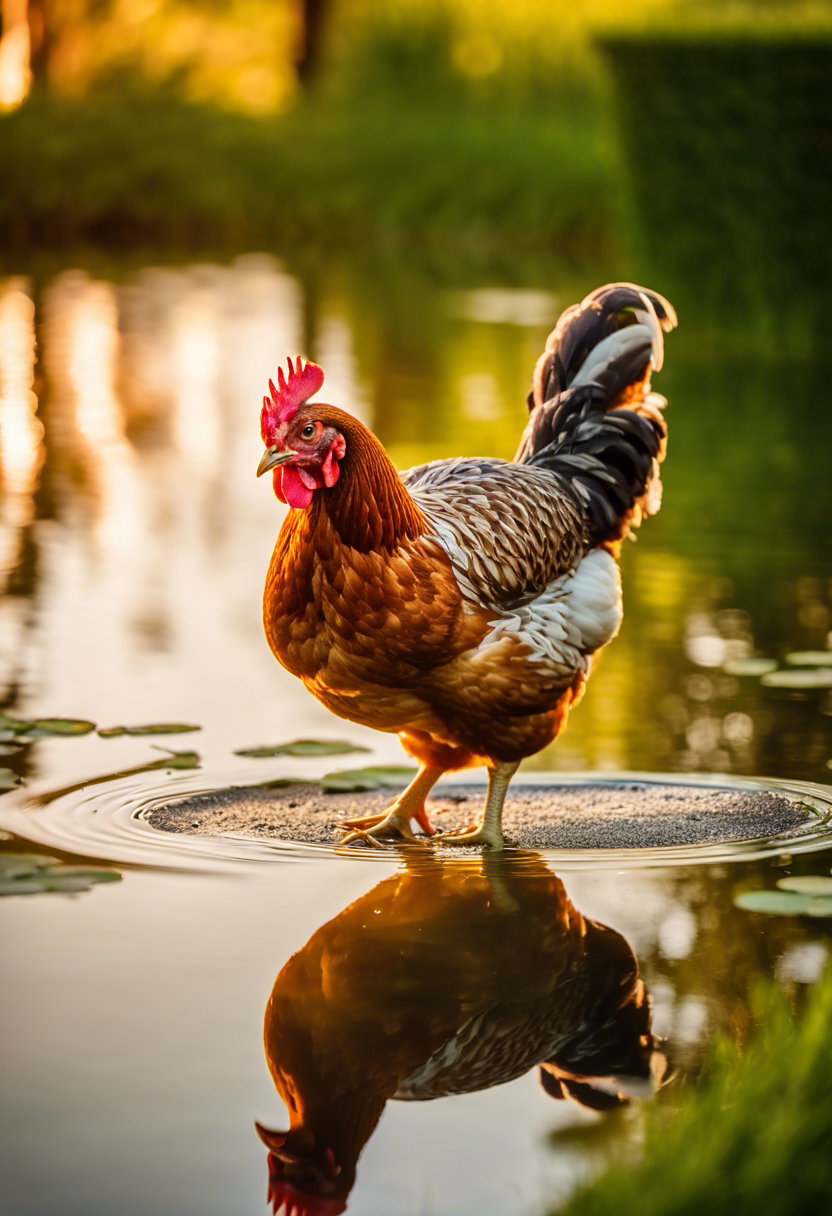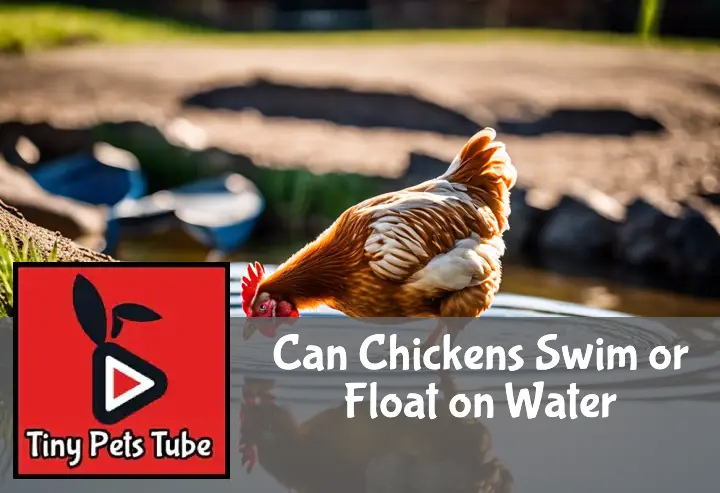Ever watched a duck paddling effortlessly in a pond and wondered, Can Chickens Swim or Float on Water like their feathery cousins? Well, you’re not alone. This seemingly simple question has ruffled quite a few feathers among the poultry-loving community.
In this blog post, we’ll dive deep (pun intended) into this topic. So buckle up, folks! We’re about to embark on a journey full of fluffy feathers and splashing waters. Keep reading about ‘Can Chickens Swim or Float on Water?’
Key Takeaways
- Chickens can technically swim, but they are not naturally inclined to do so.
- They lack the physical adaptations like webbed feet that make swimming easy for other birds.
- Chickens have a layer of down beneath their feathers which can get waterlogged, making it difficult for them to float.
- Prolonged exposure to water can lead to hypothermia in chickens.
- It’s best not to force chickens into water as it can cause them stress.

Can Chickens Swim?
Well, the question of “Can Chickens Swim or Float on Water” is a bit like asking if cats can bark. It’s not exactly in their wheelhouse, but it’s not entirely impossible either. Let’s dive into the nitty-gritty of chickens’ swimming abilities and poultry water safety.
The Anatomy of Chickens and Swimming
Chickens aren’t built like ducks or other water-loving birds. Their feather waterproofing isn’t as developed, which means they get waterlogged pretty quickly. This affects their chicken buoyancy, making them more likely to sink than float.
Now let’s talk about legs. You see, chickens have these skinny little legs that aren’t designed for paddling around in water. Unlike web-footed birds, their leg design doesn’t lend itself well to aquatic adventures.
So, while chickens might have some basic avian anatomy swimming skills, they’re definitely not Michael Phelps in the poultry world.
Instances of Chickens Swimming
Despite their physical limitations, there are documented cases of chicken swimming. These instances usually involve some sort of emergency situation where the chicken has no choice but to take a dip.
For example, there was this one time when a hen named Gertrude ended up in her owner’s pool after being chased by a dog. She managed to stay afloat long enough for her owner to fish her out with a pool net.
But don’t get it twisted – these are exceptions rather than the rule. Most chickens would prefer to keep their feathers dry and stick to pecking around on solid ground. So while they may have some rudimentary aquatic survival skills, it’s best not to test them unless absolutely necessary!
Do Chickens Float on Water?
Well, let’s dive in and find out! It’s a question that has ruffled many feathers. Can our feathery friends, the chickens, float on water?
The Physics Behind Floating
Now, before we get all clucked up about this, let’s talk science. You see, buoyancy principles play a big role here. In simple terms, buoyancy is what allows objects to float. It’s all about density and displacement of water.
Chickens are pretty fluffy creatures with a lot of surface area thanks to their feathers. This surface area impact on floating can’t be ignored. Their body composition also plays a part in their ability to float or not. Chickens have hollow bones which make them less dense than water.
So theoretically speaking, applying the Archimedes’ principle in birds, chickens should be able to float because they’re less dense than the water they’d displace. But remember folks, theory and reality don’t always see eye to eye!
Instances of Chickens Floating
Now let’s talk real life! There have been numerous chicken floating stories where these feathered fellows were seen bobbing around on water like tiny feathery boats.
One such instance was when a farmer found his flock chilling out on a flooded field during heavy rain. These real-life examples of floating chickens show that under certain conditions (like being calm and not panicking), chickens can indeed exhibit some level of poultry buoyancy.
But remember folks, just because they can doesn’t mean they should! Always prioritize water safety for poultry because while it might seem like fun and games, it could lead to some serious chicken drama! So next time you wonder ‘Can Chickens Swim or Float on Water?‘, remember – yes they can float but swimming…well that’s another story for another day!

Why Don’t We Usually See Chickens Swimming or Floating?

Well, it’s not every day you see chickens swimming or bobbing about in a pond. It’s like seeing pigs fly, right? But there’s a good reason for this uncommon sight. Let’s dive into their natural behaviors and habitats, and the potential risks and dangers when they are in water.
Natural Behavior and Habitat of Chickens
Chickens are landlubbers at heart. Their domesticated chicken habitat is usually a cozy coop or an open yard where they can peck around freely. They’re not big fans of water, unlike ducks or geese. This poultry natural behavior stems from their wild ancestors who lived in dense forests – not exactly prime swimming spots!
Their chicken instincts tell them to avoid large bodies of water. You see, chickens aren’t built for swimming. Unlike most avian species, they don’t have webbed feet or waterproof feathers that make water fun. Plus, their heavy bodies make floating a bit of a challenge.
Risks and Dangers Associated with Chickens in Water
Now let’s talk about the dangers lurking in the deep for our feathered friends. The biggest risk? Drowning! Yes folks, chickens can drown pretty easily due to their physical limitations. Their feathers get saturated quickly which weighs them down – talk about a feather saturation danger!
Then there are health issues related to water exposure. Wet conditions can lead to hypothermia and respiratory problems in poultry – definitely not something you want your cluckers dealing with.
And let’s not forget predators! Bodies of water often attract all sorts of critters that wouldn’t mind having chicken for dinner (predator threats chickens water). So while it may seem cute to have your hens paddling around, remember these swimming hazards for chickens. It’s always best to keep them safe and dry in their natural habitat.
How to Ensure Safety if a Chicken Ends Up in Water?
So, we’ve established that Can Chickens Swim or Float on Water isn’t exactly their forte. But what happens when our feathery friends find themselves in a watery predicament? Let’s talk about some strategies for chicken water safety and preventing those heart-stopping moments of drowning in chickens.
Immediate Actions to Take
First thing’s first, don’t panic! If your chicken takes an unexpected dip, swift and calm action is key. Start by rescuing chickens from water as quickly as possible. Remember, they’re probably more scared than you are!
Once you’ve got them out of the drink, it’s time for some tender loving care. Providing first aid for wet chickens involves drying them off thoroughly – no one likes being soggy! Use towels or even a hairdryer on a low setting to get them dry and cosy.
The next step is all about comfort. Reducing stress in submerged chickens can be achieved with some gentle handling and reassuring clucks (yes, you may have to practice your chicken language!). Lastly, keep an eye out for any signs of distress or illness – this is where your emergency care for drowning poultry skills might come into play.
Long-term Precautions
Now that we’ve got the immediate response covered, let’s look at how we can prevent these watery mishaps from happening again. It starts with making sure your chicken coop is waterproofed. A bit of chicken coop waterproofing can go a long way in keeping your flock safe and dry.
Next up is removing any potential water hazards around the yard or pen. This could involve filling in puddles after rain or securing areas prone to flooding. Remember, prevention is always better than cure!
Training chickens away from water might sound like a tough gig but trust me, it’s doable. Chickens are smarter than you think! And finally, creating safe drinking areas for chickens can help ensure they’re getting the hydration they need without the risk of taking an unplanned swim.
So there you have it folks – a quick guide to safeguarding your poultry pals from water hazards. Remember, stay calm, act quickly and make those preventative changes to keep your flock safe and sound.

To Wrap Up
So, there you have it. As surprising as finding a pineapple in a chicken coop, Can Chickens Swim or Float on Water? Yes, but it’s not their favorite pool party. They’re more like reluctant swimmers who’d rather sunbathe than do laps.
Remember, keep an eye on them near water. After all, chickens are to swimming what cats are to vacuum cleaners – not the best of friends!


